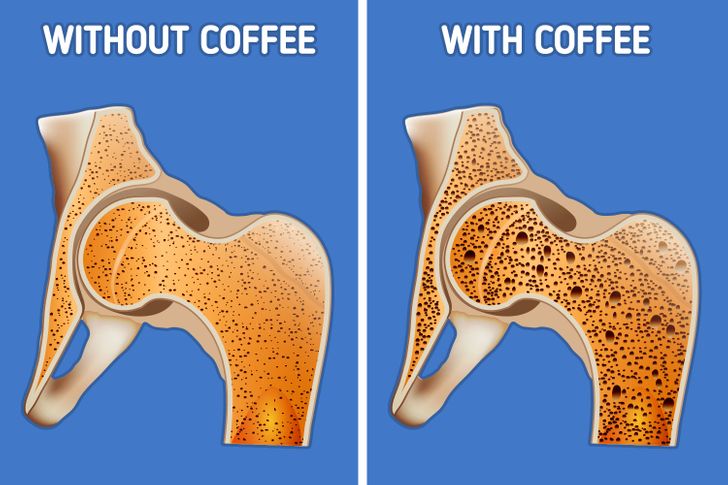For many, coffee is the go-to morning ritual that kick-starts the day with a burst of energy and mental clarity. However, while a cup of coffee can seem like the perfect solution to morning grogginess, drinking it first thing in the morning may have some surprising—and sometimes counterintuitive—effects on your body. In this detailed guide, we explore what can happen if you drink coffee on an empty stomach and early in the morning. We’ll dive into the science behind why you might feel sleepier, lose essential minerals, experience stomach upset, risk weight gain, worsen anxiety, and even dry out your skin. Read on to understand the potential side effects and discover ways to enjoy your coffee without compromising your health.
You May Feel Sleepier: The Paradox of Caffeine Overuse

It might seem counterintuitive, but drinking coffee first thing in the morning can sometimes leave you feeling sleepier. While caffeine is widely known as a stimulant, its effects can vary based on timing, individual physiology, and your body’s natural cortisol levels.
Key Points:
Cortisol Levels:
Your body naturally produces cortisol—a hormone associated with alertness—at its highest levels in the early morning. Consuming caffeine during this peak can interfere with cortisol production, potentially leading to a rebound effect where you feel more tired later on. Harvard Health explains how cortisol rhythms interact with caffeine.
Tolerance and Dependence:
Regularly drinking coffee first thing may lead to caffeine tolerance. Over time, your body may require even more caffeine to achieve the same stimulant effect, eventually resulting in fatigue when the caffeine wears off.
Disrupted Sleep Cycle:
If your morning coffee affects your natural energy rhythm, it can disrupt your circadian cycle, making it harder for you to wake up refreshed.
Practical Tip:
Consider delaying your coffee intake by an hour after waking to allow your cortisol levels to naturally decrease. This can help maximize the stimulating effects of caffeine without interfering with your body’s natural wakefulness cycle.
Your Body May Lose Essential Minerals More Quickly: The Diuretic Effect of Caffeine

One of the lesser-known side effects of drinking coffee on an empty stomach is its diuretic effect, which can lead to a faster loss of essential minerals and nutrients from your body.
Understanding the Diuretic Action:
Increased Urination:
Caffeine acts as a diuretic, increasing the frequency of urination. This increased fluid loss can result in the depletion of important electrolytes such as magnesium, potassium, and calcium.
Impact on Bone Health:
Over time, losing minerals like calcium through excessive urination can potentially affect bone density. The Mayo Clinic has documented how a high intake of caffeine may contribute to bone thinning if not balanced with adequate nutrition.
Electrolyte Imbalance:
An imbalance in electrolytes can lead to symptoms such as muscle cramps, fatigue, and overall weakness. It’s important to maintain a balanced diet and proper hydration to mitigate these effects.
Practical Tip:
Ensure that your morning routine includes a nutritious breakfast rich in minerals and consider balancing your coffee with a glass of water or an electrolyte-rich beverage. This can help replenish the minerals that caffeine might deplete.
It May Upset Your Stomach: How Empty Stomach Coffee Can Cause Gastrointestinal Discomfort

Drinking coffee first thing in the morning, especially on an empty stomach, can irritate your digestive system and lead to various gastrointestinal issues.
How Coffee Affects the Stomach:
Acidity and Irritation:
Coffee is naturally acidic, which can irritate the lining of your stomach. When consumed on an empty stomach, the acid has a more direct effect, potentially causing discomfort, acid reflux, or even gastritis over time.
Increased Production of Stomach Acid:
Caffeine stimulates the production of gastric acid, which may lead to symptoms such as heartburn or indigestion. This can be particularly problematic for individuals with sensitive stomachs or existing digestive disorders.
Digestive Disruption:
The combination of acidity and increased gastric secretion can disrupt the normal digestive process, making it difficult for your stomach to process food efficiently once you do eat.
Practical Tip:
If you experience stomach discomfort, try eating a small, light snack before your coffee. Alternatively, opt for low-acid coffee varieties or cold brew, which tend to be gentler on the stomach.
For more information on coffee’s effects on digestion, WebMD offers detailed insights and tips for managing acid reflux related to coffee consumption.
It May Lead to Weight Gain: Understanding Coffee’s Impact on Metabolism

While coffee is often touted as a metabolism booster, drinking it first thing in the morning can sometimes have unintended consequences on your weight management goals.
How Coffee Can Influence Weight:
Increased Cortisol and Insulin Resistance:
As mentioned earlier, consuming coffee during peak cortisol hours can disrupt your hormonal balance. Elevated cortisol levels are associated with increased fat storage and may contribute to insulin resistance, both of which are risk factors for weight gain.
Impact on Appetite:
Although caffeine can temporarily suppress appetite, it may also lead to rebound hunger later in the day. Over time, this cycle can result in overeating and weight gain if not managed properly.
Metabolic Effects:
While moderate coffee consumption can boost metabolism, excessive intake—especially on an empty stomach—may lead to metabolic dysregulation. This can hinder your body’s ability to burn calories efficiently.
Practical Tip:
Maintain a balanced approach by limiting your coffee intake and pairing it with a nutrient-dense breakfast. This can help stabilize your blood sugar levels and prevent overeating later in the day.
For further reading on the relationship between coffee, metabolism, and weight, check out Healthline’s comprehensive guide on coffee and weight loss.
It Can Worsen Anxiety: The Link Between Morning Coffee and Increased Stress
For individuals prone to anxiety, drinking coffee first thing in the morning might exacerbate feelings of nervousness and stress.
The Anxiety Connection:
Caffeine’s Stimulant Effects:
Caffeine is a potent central nervous system stimulant. For some people, especially those sensitive to its effects, even a small amount can trigger symptoms such as increased heart rate, jitteriness, and heightened anxiety.
Interference with Neurotransmitters:
High doses of caffeine can interfere with the balance of neurotransmitters in the brain, potentially worsening anxiety symptoms. This is particularly true when caffeine is consumed on an empty stomach, where its effects are more pronounced.
Sleep Disruption:
Anxiety and poor sleep quality often go hand in hand. If your morning coffee disrupts your sleep cycle by altering your natural cortisol rhythm, it may create a feedback loop that intensifies anxiety.
Practical Tip:
If you struggle with anxiety, consider reducing your caffeine intake or switching to a lower-caffeine alternative like green tea. Additionally, pairing your coffee with a calming breakfast ritual, such as mindfulness or light stretching, can help mitigate its stimulating effects.
For more expert advice on caffeine and anxiety, Psychology Today provides useful insights and strategies for managing stress.
It Can Dry Out Your Skin: The Hydration Impact of Morning Coffee

Drinking coffee first thing in the morning can have a dehydrating effect on your body, which may extend to your skin. Dehydration is one of the primary causes of dry, lackluster skin.
Understanding the Skin Impact:
Diuretic Properties of Caffeine:
Caffeine increases urine production, which can lead to a reduction in overall body hydration. When your body loses more water, it affects skin elasticity and moisture levels.
Nutrient Depletion:
Along with water, essential nutrients that support skin health—such as vitamins and minerals—may be lost through excessive urination. This can lead to dull, dry skin that is more prone to fine lines and wrinkles.
Compromised Skin Barrier:
A lack of adequate hydration can weaken your skin’s natural barrier, making it more susceptible to environmental stressors and premature aging.
Practical Tip:
To combat the drying effects of coffee, drink a glass of water immediately after your morning cup. Incorporate hydrating foods into your breakfast, such as fruits and vegetables, and consider using a good quality moisturizer to help lock in moisture.
For more tips on maintaining skin hydration, Harvard Health Publishing offers evidence-based advice on skin care and hydration.
Additional Strategies for Managing Your Morning Coffee Routine
While the potential downsides of drinking coffee first thing in the morning can be concerning, you don’t have to give up your beloved brew entirely. Here are some additional tips to optimize your coffee routine and minimize adverse effects:
Moderation is Key:
Limiting your coffee intake to a moderate amount can help prevent many of the negative side effects described above. Try to stick to one or two cups rather than excessive amounts.
Pair Coffee with a Nutritious Breakfast:
Consuming a balanced meal along with your coffee can help buffer its effects on your stomach and metabolism. A breakfast rich in protein, fiber, and healthy fats stabilizes blood sugar levels and supports overall health.
Choose Quality Over Quantity:
Opt for high-quality, organic coffee whenever possible. Lower-quality coffees may contain more contaminants and chemicals that can further exacerbate health issues.
Monitor Your Body’s Response:
Pay attention to how your body reacts to your morning coffee. If you notice persistent issues such as anxiety, stomach discomfort, or dry skin, consider adjusting the timing, amount, or type of coffee you drink.
Stay Hydrated:
Always follow up your coffee with water to stay properly hydrated. Consider adding a splash of lemon to your water for an extra vitamin C boost and a refreshing start to your day.
Conclusion: Enjoy Your Morning Coffee Wisely for Optimal Health
Drinking coffee first thing in the morning can be a double-edged sword. While it offers benefits like a quick energy boost and improved alertness, it can also lead to unexpected side effects such as feeling sleepier, losing essential minerals, upsetting your stomach, contributing to weight gain, worsening anxiety, and drying out your skin.
The key to enjoying coffee lies in understanding its effects and implementing strategies to mitigate its downsides. By adjusting the timing of your coffee, pairing it with a balanced breakfast, moderating your intake, and taking proactive steps to maintain hydration and overall health, you can continue to enjoy your morning ritual without compromising your well-being.
Remember, every body reacts differently to caffeine. The insights shared in this guide are designed to help you make informed choices about your coffee habits. With the right approach, you can harness the benefits of your morning brew while minimizing any potential adverse effects.
For further expert advice on managing your coffee intake and optimizing your morning routine, explore trusted sources like Healthline, Mayo Clinic, and Harvard Health Publishing. Embrace a mindful approach to your coffee consumption and set yourself up for a healthier, more energized day.
Preview photo credit Shutterstock.com









